|
|
|
Sort Order |
|
|
|
Items / Page
|
|
|
|
|
|
|
| Srl | Item |
| 1 |
ID:
178198


|
|
|
|
|
| Summary/Abstract |
“Strategic culture” is one of those conceptual bridges that link history with political science because, among other reasons, it reminds us of the hold that memories of past events can continue to exercise upon contemporary reality. But those memories are always subjective, sometimes downplayed to the point of nearly being forgotten altogether, at other times so overstated as to yield a highly distorted sense of the past and of its relationship to the present. This article constitutes a revisitation of contemporary Quebec strategic culture, from the perspective of historical memory. That strategic culture has of late been so strongly stamped with the impress of a “Pearsonian internationalism” that it becomes easy for analysts to confuse it with “pacifism.” Yet it has also been a strategic culture that stems from a great deal of historical amnesia. What has been effaced from the collective memory is the long period in which war was endemic in New France—the period that gives the lie to the notion of Quebeckers somehow being a “pacifistic” folk. This was the sanguinary era upon which the historian Francis Parkman focused such a large share of his prodigious intellectual energies. Only the closing act of this era seems to have escaped erasure from Quebec’s collective memory. Indeed, that act, which took place on the Plains of Abraham, has been “remembered” only too well. So well has it been recollected, in fact, that it has fostered within Quebec society the unshakable conviction that, for Quebeckers, war must always be a risky undertaking susceptible of leading to catastrophe.
|
|
|
|
|
|
|
|
|
|
|
|
|
|
|
|
| 2 |
ID:
111574


|
|
|
|
|
| Publication |
2012.
|
| Summary/Abstract |
The article tackles some of the questions that arise from the invocation of "the people" in independence referendums in a contextualized way by examining the constitutional experience of two independence referendums: Quebec's unsuccessful independence referendum in 1995 and Montenegro's successful one in 2006. I argue that democratic theory does not presuppose the unified people as a decision-making unit, but rather that it conceals two, more logically primitive-and to an extent conflicted-general conceptions relevant to independence referendums. While not arbitrating between them, the concluding part argues that the tension in democratic theory ought to, at a minimum, contribute to reducing the vehemence of nationalist politics involved in attempts to achieve political independence.
|
|
|
|
|
|
|
|
|
|
|
|
|
|
|
|
| 3 |
ID:
115348
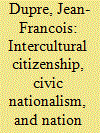

|
|
|
|
|
| Publication |
2012.
|
| Summary/Abstract |
This article analyses the current citizenship-nation building nexus in Québec in light of government publications and recent public discourses on ethnocultural pluralism and immigrant integration. First, the article surveys the changing relationship between Québécois nationalism and citizenship according to political circumstances in Québec, suggesting that debates over immigrant integration have played a central role in the creation of a civic Québécois identity, initially based on French as the public language and interculturalism. The article then analyses recent public debates surrounding 'reasonable accommodation' in Québec, and identifies a growing emphasis on laïcité - the secularisation of the public space - as identity marker. This article attributes this growing focus on secularism to dissatisfied nationalists seeking to reclaim the cultural prominence of the French Canadian majority in provincial institutions and press for measures aimed at enhancing Québec's distinctiveness and autonomy within the Canadian institutional framework. On a more normative note, the article argues that while language nationalism is reconcilable with ethnocultural pluralism, recent discourses on the secularisation of the public space constrain the emergence of an openly pluralistic stance on national belonging in the province, and undermines the legitimacy of Québec interculturalism.
|
|
|
|
|
|
|
|
|
|
|
|
|
|
|
|
| 4 |
ID:
115232
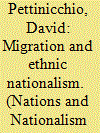

|
|
|
|
|
| Publication |
2012.
|
| Summary/Abstract |
This article explains the effects of ethnic nationalism on Anglophone and Francophone migration. The rise of Québec ethnic nationalism in the 1960s dismantled the cultural division of labour, which created new opportunities for Francophones but threatened Anglophones' traditional dominance over the Québec economy. This had negative consequences for Anglophones but positive outcomes for Francophones, which in turn accounts for differences in migration patterns. Drawing from the internal colony model as well as migration and exit-voice theories, and using ecological census data, micro-census data and election panel data, I find that the key variables that increase the likelihood of Anglophone out-migration either do not explain Francophone out-migration or have opposite effects. This is because ethnonationalist policies decreased the economic return particularly for well-educated, higher-earning, professional Anglophones in Québec, while increasing the economic position of Francophones and in particular well-educated professionals.
|
|
|
|
|
|
|
|
|
|
|
|
|
|
|
|
| 5 |
ID:
111494


|
|
|
|
|
| Publication |
2012.
|
| Summary/Abstract |
Immigrant integration is currently a prominent issue in virtually all contemporary democracies, but countries in which the historic population itself is deeply divided - particularly those with substate nations and multiple political identities - present some interesting questions where integration is concerned. The existence of multiple and potentially competing political identities may complicate the integration process, particularly if the central government and the substate nation promote different conceptions of citizenship and different nation-building projects. What, then, are the implications of minority nationalism for immigrant integration? Are the added complexities a barrier to integration? Or do overlapping identities generate more points of contact between immigrants and their new home? This article addresses this question by probing immigrant and non-immigrant 'sense of belonging' in Canada, both inside and outside Quebec. Data come from Statistics Canada's Ethnic Diversity Study. Our results suggest that competing nation-building projects make the integration of newcomers more, rather than less, challenging.
|
|
|
|
|
|
|
|
|
|
|
|
|
|
|
|
| 6 |
ID:
087768
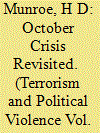

|
|
|
|
|
| Publication |
2009.
|
| Summary/Abstract |
Counterterrorism is generally understood in terrorism research as the product of rational strategic choice by governments. This is rarely the case, however: Strategic choice is often heavily circumscribed by the effects of crisis, when factors become significant drivers of government action. This paper uses the October Crisis of 1970 to demonstrate how the assumption of rational choice can be very misleading, and argues that scholarly research on counterterrorism needs a more nuanced understanding of how a governments' intent is translated into action
|
|
|
|
|
|
|
|
|
|
|
|
|
|
|
|
| 7 |
ID:
178325
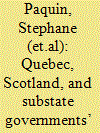

|
|
|
|
|
| Summary/Abstract |
Following Brexit (the withdrawal of the UK from the EU and the European Atomic Energy Community at the end of 31 January 2020), the British government stated that it hoped to reach a new trade agreement with Canada to be modelled after the Canada–EU Comprehensive Economic and Trade Agreement, the first free-trade deal for which Canadian provinces were directly involved at every stage of negotiations. In the UK, while there are mechanisms for the involvement of devolved regions in European policy, there is no clear constitutional doctrine as to the roles they should play in elaborating trade policy more generally. Moreover, the asymmetric nature of the UK’s devolution system complicates the involvement of its devolved governments in trade negotiations. By providing a specific focus on the cases of Quebec and Scotland, this article provides a comparison of substate governments’ roles in trade negotiation and trade promotion. It concludes that, while there seems to be only limited scope for substate governments’ formal input into future trade negotiations, their trade and investment promotion organizations allow them to pursue different objectives over trade outcomes within a unified national framework.
|
|
|
|
|
|
|
|
|
|
|
|
|
|
|
|
| 8 |
ID:
156282
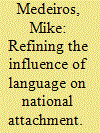

|
|
|
|
|
| Summary/Abstract |
Fears related to a group's culture can negatively impact national attachment. This article brings new insight into minority groups’ national attachment by empirically exploring the influence of language threat perceptions on it. Quebec is used as a case because of its longstanding tensions with Canada. The results of the analyses not only demonstrate that perceiving French as threatened positively influences Quebecers’ support for independence and negatively impacts their feelings towards Canada, but the findings also permit the conclusion that it is an individual's linguistic perceptions that directly determine their national attachment rather than simply their linguistic group membership.
|
|
|
|
|
|
|
|
|
|
|
|
|
|
|
|
| 9 |
ID:
129553


|
|
|
|
|
| Publication |
2014.
|
| Summary/Abstract |
Charles de Gaulle's visit to Quebec in 1967 continues to attract significant scholarly and popular attention. Despite ongoing efforts to broaden our understanding of the evolution of France-Quebec relations during the 1960s, de Gaulle's visit remains the pivotal event of that rapprochement and is believed to confirm the French president's personal support for Quebec's independence, stemming from his efforts to position post-colonial France as the champion of decolonization and self-determination for dependent peoples. This scholarly consensus, however, can be challenged by even a cursory glance at France's policies toward New Caledonia in the 1960s, which reflected a fierce French determination to prevent the loss of its Pacific Ocean territory. Instead of accepting, much less encouraging, New Caledonia's autonomy, the French state in fact re-colonized New Caledonia over the course of the 1960s, a situation that compels us to examine more closely the attitude of de Gaulle and the French state toward "decolonization" in Quebec during the same period. The national aspirations that mattered most to France or to de Gaulle were those of France itself.
|
|
|
|
|
|
|
|
|
|
|
|
|
|
|
|
|
|
|
|
|